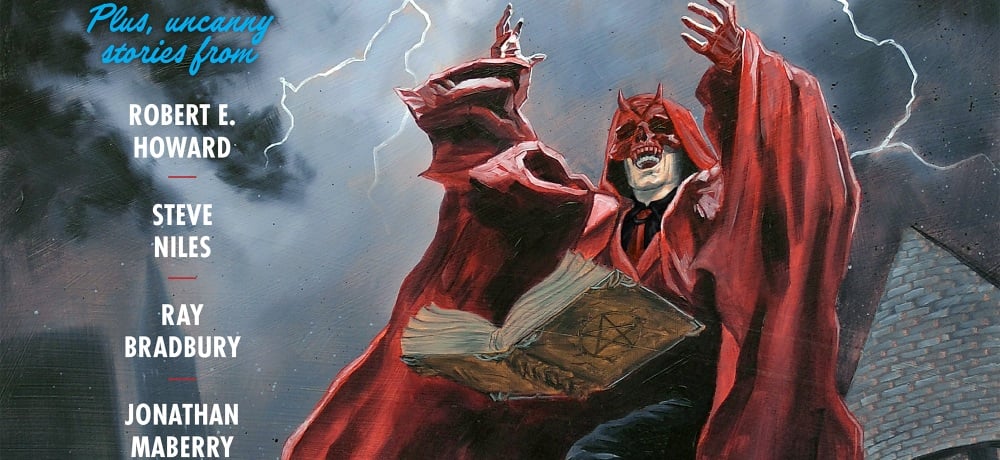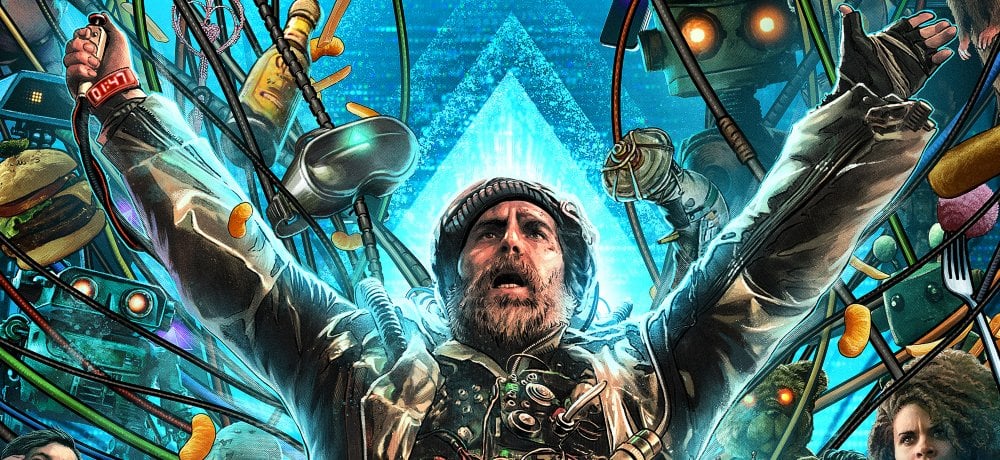





Nearly one decade after making viewers afraid to go in the water (without risking the loss of an appendage) in Piranha 3D, Alexandre Aja dove back into underwater horror this past summer with Crawl, a claustrophobic thriller that pits college swimmer Haley (Kaya Scodelario) and her estranged father (Barry Pepper) against ravenous alligators amid the chaos of a Category 5 hurricane.
Crawl is undoubtedly one of my favorite moviegoing experiences of 2019, and with the film out now on Blu-ray, DVD, and VOD from Paramount Home Entertainment, Daily Dead had the pleasure of speaking with Aja once again (in case you missed it, read Heather Wixson's recent interview with Aja) about the ambitious underwater filming for Crawl (which is explored in-depth in the Blu-ray's special features), the serendipity of getting to work with Sam Raimi, and how this water-centric filming experience compared to making Piranha 3D. With plenty of projects on his horizon, we also talked with Aja about his upcoming interactive haunted house movie for Amblin and the series adapation of Junji Ito's Tomie.
Congratulations on Crawl, Alexandre. It was one of the most intense and enjoyable viewing experiences I had in theaters this year, and I'm excited to see it come out on Blu-ray just in time for Halloween. It seems like perfect timing.
Alexandre Aja: I'm really happy of the release timing, because I've been talking so much about how we made this movie and how difficult it was. And sometimes I feel that people are like, "Oh yeah, of course every movie is difficult." But when people actually see the behind the scenes, they're going to realize just how intense it was. Because watching the special features, like the "Beneath" Crawl special feature where we're walking around with Sam Raimi and you're going into the tanks and you're basically building this house from the ground up and then completely submerging it.
This is a movie where not only the cast, but the crew and yourself were not even knee-deep in water, but chest-high in water. It just looks like it was an amazing but difficult shoot to pull off.
Alexandre Aja: It's a funny balance, because in the story, Haley has to save her dad in the time of one day. We start early in the morning and end up before sunset. She's going through hell and back. But in real life when we were shooting, everything was real except the alligators. So it was indeed more simple, but at the same time it was also during 30 days. I don't know which one you want at the end. You prefer one day and you have the alligators, or just 30 days of being in the water every single day.
With 30 days of underwater hell, you'd almost prefer the alligators at that point. But that's what makes it so authentic. You feel like you're right there with them and it's so claustrophobic, too, because on top of being underwater, you're in the cellar for most of the movie before you are forced out of there. But I love that setting, because it's so claustrophobic and it puts you right in there along with Haley and her father.
Alexandre Aja:For me, you have to imagine when I got the script, the whole script was taking place only in the crawlspace. I thought it was a very big opportunity of doing a home invasion movie about the elements of breaking through that family home. And then with the elements come the alligators. But the real point was that ticking clock of the water coming up from the crawlspace, up to the rooftop during the whole time of the story. And so, yes, it was quite something to build seven tank all together. It was a big nightmare.
It feels fitting, too, that you had Sam Raimi [as a producer] on this, because the movie does start out in the cellar and you immediately think, "Oh, it's like if Evil Dead got flooded." And there's some serendipity here, because in the special features, Sam Raimi mentioned how he wrote a letter to you after Haute Tension, and he wanted you to do a movie [The Messengers] with him. But then you had that horror fan's dream of picking between that and a Wes Craven project with The Hills Have Eyes. And then it ended up going full circle where you got to work with Raimi. So, what's that been like for you to be able to work with two of these titans of horror in your career?
Alexandre Aja: It's really something. I kept that in the back of my mind since the day I had to choose between Wes Craven and Sam Raimi for my first English-speaking movie. At the time I was like, "Okay, so I'm going with The Hills Have Eyes, but there is nothing more that I would love than to work with Sam Raimi." Because he's definitely the director that kind of made me want to become a filmmaker as well. This project, I remember developing the script and then at some point we said like, "Oh, you know, we should maybe try to ask Sam if he's interested to come onboard and help us." I was convinced that he would never remember that we had that interaction. He's saying that he wrote me a letter. I think I wrote him a letter to apologize. But anyway, maybe we both wrote a letter to each other. He completely remembered and he was like, "Yeah, if it's you, I really want to do it."
Then he read the script and he was like, "You had so many great ideas, right on the spot." And then it was just a perfect way, when everyone on board is looking in the same direction and everyone is working with the same goal of creating a perfect suspenseful ride—it's a very simple, straightforward movie, but very efficient. And of course, I have to say that this crawlspace, this basement was such a location. And the Evil Dead basement is like the other one. It goes into the collection of the best basement movies.
Spiritually, they go together. You can have a movie marathon with those films and enjoy them for those reasons. And you're no stranger to underwater movies coming into this. You directed Piranha 3D, which a lot of horror fans love. It's that perfect blend of horror and comedy. But that was on the other side of this decade. So, coming into this now almost 10 years later, did your approach to underwater filming change based on the technology changes or anything like that, or was it very similar for you in a lot of ways?
Alexandre Aja: I think it's very similar. I believe that when we did Piranha, it was still film cameras, so we had to actually remove the camera from the actual underwater casing to change the film. It was very time-consuming. Now, you don't have to do that that much, but the restrictions are still the same. And even if the cameras are smaller, even if the the casing is maybe smaller, it's all about the talent. It's all about the talent of the people. Operating underwater, you most of the time never have the time to create a crane shot underwater, so it's all about, who's going to operate, how are you going to get it?
Operating above water is another thing. First I forgot how difficult Piranha was. And then I said, "Oh yeah, of course, Crawl. No problem." Then you realize, and everything comes back as an acid flashback. And you're like, "Oh f--k, that was so difficult." When you have to spend more than 10 hours in the water, when you have to deal with all the extras, everything moves a little slower. In this one, we added things that we didn't have on Piranha, which is the wind and the rain. The water in the tank is kind of warm, but the rain is not, it's super cool, and the wind and the sound and the dark. But I'm talking to you right now and if I find the right story that implies shooting in the water again, I think I will go.
And then there can be the Alexandre trilogy of underwater films.
Alexandre Aja: Yes.
Before I let you go, you have a couple of upcoming projects that our readers are really excited about. One is the adaptation of Junji Ito's Tomie and the other is this untitled haunted house movie for Amblin that sounds like a very interactive, groundbreaking type of film. Is there anything you can tell us about those projects?
Alexandre Aja: The Amblin project is such an exciting one. With the technology that we're developing, that kind of choose-your-own-adventure technology, we're going to shoot maybe the length of three or four movies. The experience will still be a feature film, but it depends on where you go, what you decide. It will be a full, different experience every time you watch the movie. Imagine every time you watch a normal movie and you're kind of like, "Why? Why did he not switch on the lights?" Or, "Why are they not staying together?" And, "Why do they want to get separated?" I mean, all those rules that we are yelling at the screen to question the choice of the characters, you're going to be able to do it. You're going to actually be able to decide by yourself. So it's a very exciting project, especially with a haunted house concept, and it's also a great story, but I cannot reveal too much about it yet.
Then, Tomie, Junji Ito is the Japanese Stephen King. Everything he's doing is so twisted and weird and unnerving and also fascinating in the theme and so deep in the human psyche. Tomie is one of his most crazy stories. To develop this with David Leslie Johnson-McGoldrick for Quibi is really exciting. We are writing the scripts right now, we're finishing them, and hopefully we'll be shooting very soon. It is quite a unique take on the high school year. That's where we're going to focus the first stories.